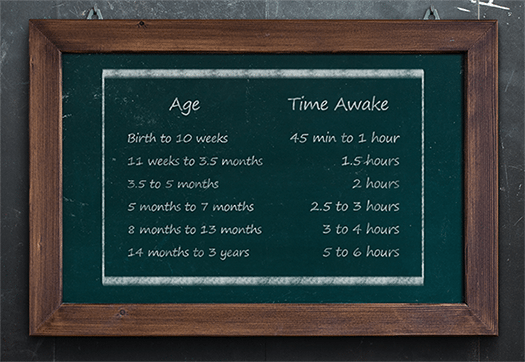My most important tip for baby sleep
Here is my most important tip for baby sleep. While parenting can be considered a juggling act, baby sleep can be likened to a mine field. One misstep and BOOM, everything seems to get out of whack. It’s true that one bad sleep day can affect night time and that can affect the next day and before you know it your set sleep times are thrown out and you don’t know what to do next (where was that manual again?).
As a parent to a new baby you’ll have plenty of days that don’t go to plan (like most of them), but for the sake of your sanity I want to give you ONE TIP. One tip that will help your little one get better sleep, and give you a starting point of what to do next. That tip is:
KNOW HOW LONG YOUR BABY SHOULD BE AWAKE
Yes, I said awake – not asleep.
When sleep doesn’t go according to plan, and that will sometimes happen (probably often), the best solution is to go by how long your baby has been awake during the day.
How long should your baby be awake?
Time awake differs by age, so you’ll find my general recommendations below. And it may not be as long as you think:
Newborns (birth to 10 weeks) 45 min to an hour
11 weeks to 3. 5 months: 1.5 hours of time awake
3.5 months to 5 months: 2 hours of time awake
5 months to 7 months: 2.5 to 3 hours of time awake
8 months to 13 months: 3 to 4 hours of time awake
14 months to 3 years: 5 to 6 hours of time awake
NAP TIMINGS
By knowing how long your baby should be awake, you can schedule day time naps accordingly. This can work well to help her catch up on sleep on those bad days. If you get the timing right she should automatically sleep longer to catch up.
Unfortunately this doesn’t always happen. If you know she has missed sleep she needs, you can try and prompt her body to catch up by putting her down a little bit earlier, OR you can throw in an extra nap.
Our bodies are fascinating machines, and they’re capable of adapting to an astonishing number of situations, but lack of sleep isn’t one of them.
When we’re overtired, our brains typically overcompensate by letting out excessive amounts of hormones designed to keep us awake. That’s why babies who have missed their sleep window (those wake times above) often don’t appear tired. They get wired, fussy and hyperactive, making it much harder for them to get to sleep.
It’s a frustrating, unpleasant cycle, so avoid it if you can. Keep a close eye on your baby’s wake time and plan your day accordingly. And if it’s all gotten a bit too much and no-one’s getting the sleep they need, book in a free call or contact me! Because everyone needs a good night’s sleep!

